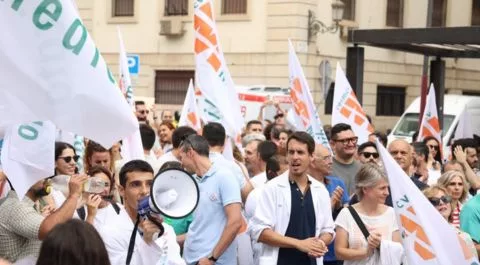A nationwide mobilization with a clear message
On Friday, June 13, thousands of doctors across Spain mobilized to protest their working conditions. The strike, called by the Confederation of State Medical Unions (CESM), brought hospitals and clinics to a standstill in many regions. Their message was clear: Spain’s healthcare system needs structural change.
The Statute Framework as a trigger
The immediate cause was a new draft of the Statute Framework regulating employment within the National Health System. For unions, the proposed text not only fails to improve current conditions but could entrench an unsustainable model: exhausting work schedules, poorly compensated shifts, and a lack of professional recognition in public healthcare.
Key demands of the medical profession
Core issues raised by healthcare professionals
- Limit weekly working hours and count shifts as overtime
- Establish a specific professional statute for doctors
- Implement real measures for work-life balance and rest after shifts
These demands stem from years of growing tension. Increasing patient loads, an aging medical workforce, and chronic underinvestment have fueled a widespread sense of burnout. The June 13 strike represents not just a protest, but a visible symptom of deeper systemic issues that require more than cosmetic fixes.
Impact on hospitals and institutional response
Strike participation varied by region, but its impact was tangible. In areas like Murcia and the Valencian Community, scheduled consultations and surgeries were suspended. While the Ministry of Health has expressed openness to dialogue, the gap between what is being offered and what is being asked remains significant. Meanwhile, patients—the very center of the system—witness a decline in the quality of care.
A human resources perspective on healthcare
At onhunters, we specialize in recruiting mid- and senior-level professionals for the healthcare sector. We have extensive experience supporting both public and private healthcare institutions in their talent acquisition and retention efforts. Learn more about our work in this field at onhunters.com/empresas/healthcare-life-sciences.
We view the strike not only as a labor action, but as a moment to reflect on the future of the medical profession, the well-being of healthcare workers, and the long-term sustainability of Spain’s healthcare system. This includes critical roles such as medical directors, quality managers, hospital administrators, and leaders in digital health transformation.
The risk of losing qualified medical talent
Medical talent under pressure
This is not just about salaries. It’s about recognizing a demanding profession that requires continuous education, high responsibility, and resilience. Attracting and retaining top medical talent is increasingly difficult, especially as many professionals consider moving abroad or leaving public healthcare altogether. The situation is particularly critical in rural areas and in specialties suffering from chronic shortages.
A chance to rethink employment models in healthcare
For onhunters, this strike is also an opportunity to rethink how we structure healthcare job offers, how we listen to professionals, and how we design a fairer and more motivating employment model from an HR perspective.
We support healthcare organizations in building value-based talent strategies that align with the current priorities of healthcare professionals: stability, recognition, and purpose.
Conclusion: Quality care starts with those who deliver it
Improving medical care and ensuring a sustainable public healthcare system begins with taking care of those who make it possible—doctors, nurses, technicians, and healthcare leaders who uphold the system every day.



